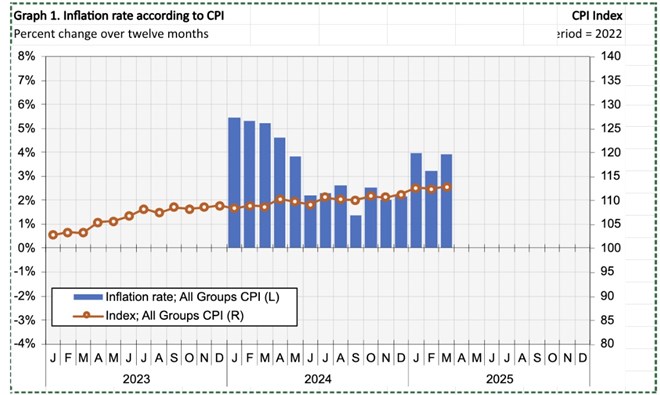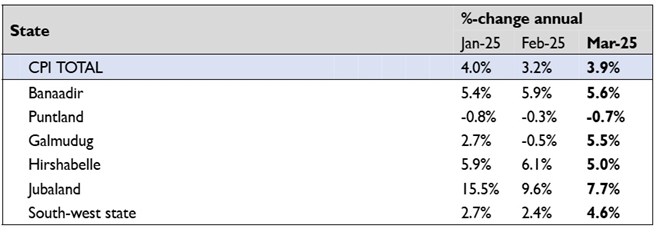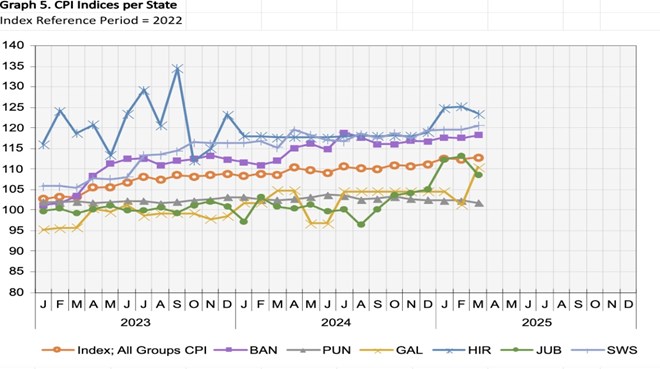Wednesday June 4, 2025
By Abdisalam Abdirahman Mohamed
Introduction
On May 4, 2025, the Somalia National Bureau of Statistics (SNBS) achieved a historic milestone by launching a modernized Consumer Price Index (CPI). This was the first nationally representative CPI. A few weeks later, on May 22nd, the Bureau released the first quarterly CPI report under this new framework. The report provided rich information and analysis about price dynamics across the country. This achievement represents an imperative shift from a CPI that focused only on Mogadishu (Banadir region) to a comprehensive national and state-level price monitoring system. Puntland and Somaliland previously conducted CPI separately, though with outdated methodologies. The move towards integrated national CPI will lead to enhanced data quality, transparency, and relevance in national planning and policymaking.
The CPI is a technical measure that mirrors economic performance. It shows how prices of essential goods and services change over time and how they affect the lives of Somali households. The effort to cover all Federal Member States (FMS), adopting harmonized data collection methods and strengthening institutional capacity enables Somalia to create a statistical system that covers the whole economy. This will allow evidence-based national planning and policy-making, knowledge-based governance, and ultimately broad-based national development.
Transition to a modernized CPI system
Consumer Price Index measures the average change in retail prices paid by consumers for a fixed basket of goods and services over time. It is the main method for measuring inflation trends. It functions as a compass used by policymakers, private enterprise, analysts, and international development partners to determine the state of a given economy and its implications for the social and economic well-being of society. It helps governments decide both monetary and fiscal policy decisions. It ensures accurate cost-of-living adjustments, supporting social protection programs, wage negotiations, and public service salary structures. Governments also use CPI to inform budgeting, adjust tax brackets, and design inflation-sensitive interventions.
Businesses rely on CPI data to forecast demand, set prices, and evaluate market risks, while investors use it to assess macroeconomic stability and adjust investment strategies accordingly. Development partners depend on CPI to align aid disbursements and interventions with real-time economic conditions, ensuring their efforts are both efficient and relevant.
Since January 2025, SNBS has released CPI statistics reflecting new consumption weights derived from the 2022 Somalia Integrated Household Budget Survey (SIHBS). We have adopted the latest internationally recognized Classification of Individual Consumption According to Purpose (COICOP 2018), which replaced the older 1999 version. This alignment with global best practices improves data quality and comparability with CPI of other countries. It also ensures that policy decisions are based on the actual consumption behaviour of Somali households.
The launch of the new CPI framework marks a significant turning point by closing existing statistical gaps and laying the foundation for a more integrated and informed economic strategy. In addition to broader coverage, the new CPI captures price data from all FMSs, hence national and subnational representation. Monthly surveys are conducted in locations across the country, providing a geographically inclusive picture of price movements and household consumption patterns. Thus, inflation estimates no longer reflect only the capital city but the realities facing communities throughout Somalia.
The transition to a modern CPI system allows the index to better capture changes in household consumption behavior, such as increased spending in areas like telecommunications and financial services. The integration of data from the 2022 SIHBS ensures CPI weights are current and representative of actual household spending. Furthermore, Somalia has modernized its data collection methods by shifting from paper-based tools to Computer-Assisted Personal Interviewing (CAPI) systems, which improves the accuracy, speed and reliability of data collection, significantly reducing errors and enhancing the quality of statistical outputs.
The new CPI meets a range of urgent and practical needs for economic and social policymaking in Somalia. For example, it equips the Ministry of Finance with reliable inflation data for budgeting and fiscal planning, supports the Central Bank in setting evidence-based monetary policy for the anticipated new currency, and enables the Ministry of Labour and Social Affairs to align wage policies and social protection programs with real cost-of-living dynamics. This unified national price index plays a pivotal role in shaping fair, data-driven interventions that address both development and humanitarian priorities across sectors.
There have been several factors that facilitated the modernization of our CPI system. The core factor was the concerted efforts and coordination between SNBS and relevant institutions across the country. This collective approach included standardized training of enumerators, harmonization of classifications and survey tools. We also received enormous technical and financial support from our international development partners. The collaboration on the CPI modernization exemplifies a model of fruitful intra-governmental partnership. Through investment in statistical capacity and nurturing shared ownership, Somalia is rebuilding a resilient and sustainable data ecosystem that will benefit future generations.
What does the latest CPI data show?
The first release under the new Consumer Price Index system, covering the twelve months up to March 2025, reveals key national and regional inflation trends. At the national level, CPI rose by 3.9% year-on-year, with the largest price increases observed in transport (8.0%), restaurants and accommodation services (6.5%), and clothing and footwear (6.3%). In contrast, prices fell notably in information and communication services (-7.9%) and in tobacco products (-2.7%), suggesting shifting consumption dynamics and sector-specific deflationary pressures.

(Figure 1: Summary of national annual CPI changes
At FMS level, data features considerable regional variation. Jubaland recorded the highest inflation rate at 7.7%, largely due to rising utility and recreation costs. Banaadir also experienced a marked hike, with transport prices alone surging by 20.5%, contributing to a total CPI rise of 5.6%. Meanwhile, Puntland saw slight deflation of 0.7%, driven primarily by declining food prices. Both South-west and Hirshabelle reported moderate yet positive inflation, suggesting relatively stable price environment.

Table 1: Quarter one CPI dynamics at FMS level

Inflation does not impact all households evenly. Low-income families who spend a large share of their income on food, housing and transport are disproportionately affected. Rising prices mean these families must sacrifice other essentials, such as healthcare or education. With regular CPI releases, Somali households can make better-informed financial decisions. They can adjust budgets, prioritize spending, and advocate for fair wage adjustments.
Conclusion
Reliable statistical data is a cornerstone for good governance as it fosters shared understanding and consensus on what public policies, plans and development interventions to advance. Through the production of CPI data that meets international standards, SNBS enhances transparency, accountability and sound decision-making by policymakers. Public access to data builds trust between citizens and government. When policies are backed by credible evidence, confidence in governance grows. This is especially vital in a country that is steadily recovering and rebuilding institutions after decades of stagnation.
The inauguration of the CPI system marks a major milestone, but it is only the beginning of a broader statistical transformation. SNBS seeks to sustain momentum through arrays of strategic initiatives. One key priority is the regular monthly release of CPI data so that policymakers and the public have timely access to accurate economic data. Efforts are underway to disaggregate data by urban and rural areas, acknowledging the different inflationary pressures facing diverse communities.
SNBS is also laying the groundwork for a Producer Price Index (PPI) to monitor inflation at the wholesale and production levels, offering a more comprehensive view of economic trends. Alongside this, the Bureau continues to invest in institutional strengthening through staff training, infrastructure development, and enhanced coordination across government entities.
Public engagement is a priority, with statistical literacy campaigns aimed at helping citizens understand how data shapes policies and daily life. Looking ahead, SNBS plans to explore innovative data collection methods—such as electronic price monitoring, web scraping and application programming interface (API)-based data extraction—in line with emerging global practices, signalling its inclination towards modernizing Somalia’s price data systems over time.
Abdisalam Abdirahman Mohamed holds a PhD in Economics from the University of Glasgow and is the Director General of the Somalia National Bureau of Statistics.